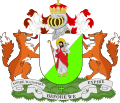Date and time notation in New Eiffel

Upon its dissolution, New Eiffel commonly used the day–month–year format (31 December 2019 or 31/12/2019) without leading zeros, abbreviated months of the year with four letters and full stops instead of the traditional European three (Janu., Febr., Marc.), spelled out the days of the month or even year on formal occasions, and regarded Monday as the first day of the week. Depending on the context, New Eiffel used both the 12-hour and 24-hour notations interchangeably and officially used the Gregorian calendar.
Date
Days, months and years
The most commonly used date format among the population was the day–month–year format (DMY; dd/mm/yyyy), written as 31 December 2019 or 31/12/2019. Leading zeros were never used. Said date format was used on all official documents by the government, such as acts of Parliament. Formal style recommendations discouraged writing the day of the month as an ordinal number (for example 31st December). It was occasionally used for incomplete references, such as "The ship departed on 12 March 1820 and arrived on the 18th". However, omitting the ordinal was acceptable as well, as in "The ship departed on 12 March 1820 and arrived on 18". In both the Republic and Kingdom of New Finland–predecessor states to New Eiffel founded on 31 December 2017 and 4 June 2018 respectively–the official date format was always day–month–year. However, when the Principality of New Eiffel initially succeeded the kingdom on 11 August 2018, the official date format was switched to month–day–year (MDY; mm/dd/yyyy)—written December 31, 2018 or 12/31/2018. New Eiffel informally switched back to using dd/mm/yyyy in July 2019, later becoming official when acts of Parliament started being recorded on 3 September.
Months of the year were abbreviated with four letters (i.e. Janu., Febr., Marc.,)—written 1 Janu. 2018—as opposed to the traditional European three (i.e, Apr, May, Jun)—written 1 Apr 2020. A period was usually added, though not using one was also commonplace despite being considered incorrect—i.e. 1 Janu 2018. As is standard in English, months were always capitalised. Furthermore, in very formal occasions and royal documentation, the number or even year was spelled out; i.e. first (of) January 2020 or first (of) January Twenty-twenty—with the year usually capitalised. Using and for years was preferred over omitting it, for instance "two-thousand and eighteen", not "two-thousand eighteen". Sometimes the year was also ceremonially referred to in Roman numerals, for instance MMXIX (2019).
Weeks
Contrasting the surrounding United Kingdom, days of the week were never included in full dates, and as such they were usually written out in full whenever referred to. Days of the week did however briefly appear in three acts of Parliament between 9 December and 20 December 2019. Nevertheless, when days of the week had to be abbreviated for brevity, they followed the regular three-letter abbreviations unlike the months of the year and did not have periods (i.e. Mon, Tue, Wed). As is standard in English, days of the week were always capitalised. Monday was the recognised first day of the week by the Church of New Eiffel because of the Biblical Sabbath, citing Genesis 2:2 "And on the seventh day God finished His work which He had made" as referring to Sunday as the seventh and final day of the week, thus making Monday the first. However, most residents actually regarded Sunday as the first day of the week. This is because two of them were emigrants from South Africa, where the first day of the week is Sunday.
Time

- See also: Time in New Eiffel
Both the 12-hour and 24-hour notations were used interchangeably, though the 12-hour clock was recommended and used on almost all official government documentation. The 12-hour notation was more commonly used when spoken, whilst the 24-hour clock was common especially in relation to telecommunications and digital clocks. Usually the 12-hour clock's suffix was spelled out with lowercase letters and periods, such as "10:30 p.m." In the 24-hour notation, it was usually written with a colon such as "22:30". When spoken, it was referred to as "twintig minute oor agt," Afrikaans for "twenty minutes past eight" or "twintig minute voor agt"; "twenty minutes before eight". The exact number was never specified and usually rounded upwards. When speaking English, the time was always precise, such as "ten thirty one". Parts of the day, like dawn, noon or midnight, were not commonly used when referring to a timeframe.
Calendar
New Eiffel used the Gregorian calendar. However, other calendar had sometimes been used ceremonially. A regnal year was seldom used wherein the year was the age of the head of state plus the month they were born. It was written without spaces and the first three-letters of the month were used, written in all lowercase. For instance, Prince Zabëlle I's last regnal year was "15nov". This year was used almost exclusively on acts of Parliament. The Atomic calendar was also originally used in acts between 17 September and 9 December 2019, though it was later removed as unnecessary. The Zësøtix calendar was also sometimes used ceremonially within New Eiffel between September 2019 and February 2020.

